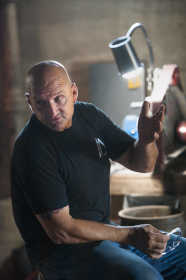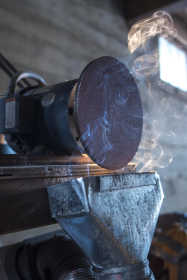Wednesday, November 6, 2019 ~ Updated 2:32 PM
If you ask Steve Watkins who he is, he quickly answers, "I'm an artist. It's as simple as that."
But Steve is not a "traditional" artist. You won't find his paintings on a wall, his sculptures in a gallery or his songs on an album.
Instead, you will find his creations in the hands of some of the world's greatest chefs, as well as in the kitchens of people who simply want to use the same culinary tools as the professionals.
Steve makes knives, but not your everyday, run-of-the mill knives. No, he makes knives as unique and artistic as they are functional.
He recently acquired the former Cape Feed & Seed Co. building in the 400 block of Morgan Oak Street in Cape Girardeau, which has become the headquarters for his knife-crafting business, Ironman Forge. It's there Steve takes rough slabs of steel and transforms them into unique works of cutlery art.
"The most important thing for me is it has to be aesthetically pleasing," he says. "I don't care how functional your knife is. If it's ugly, it's ugly. You want a knife that looks appealing, a knife you want to pick up. And when you put it in your hand, it has to feel right."

Steve's interest in knife making can be traced back to his teenage years in Cape Girardeau.
"We had horses and some cattle just north of town along Highway 177. I grew up riding horses, and that got me into training horses, and I had to do everything, including shoeing them," he says. "That's how I got into blacksmithing, and then the guy who taught me how to shoe horses mentioned one day that I could make a knife with a forge and a hammer, so I made a hunting knife for my dad."
By the time Steve was in his mid-20s, he had made four or five other knives for friends. "But then I got busy training horses and didn't make any more," he says.
Twenty-three years ago, he left Cape for North Carolina where he continued training horses until "one day, about 10 years ago, I decided that's enough. I wanted to get back to using my tools again."

And while he could have made any sort of blade, Steve chose to create culinary cutlery. "I'm a foodie, and because of that I watched a lot of cooking shows and was always looking at the knives," he explains. "I became fascinated with them and decided I wanted to make chef's knives. It's as simple as that."
Steve already knew the basics of knife making. After all, he had made hunting knives and other basic blades for some of his family members and friends. But he also realized if he wanted to make some of world's best cutlery, he needed to learn from experts about knife making and the science of metallurgy. "There's a science to it," he says. "A science to creating the proper hardness, flexibility and resiliency while still retaining an edge."
Steve became involved with the American Bladesmith Society and enrolled in the bladesmithing curriculum at Haywood Community College in Clyde, North Carolina, one of only a handful of schools accredited by the bladesmith society to teach the fine art and nuances of knife fabrication.
Over a period of months and years, he honed his skills and his cutlery designs until he created a line of knives he felt were worthy for use by professional food preparers. "I started giving them to chefs to see what they thought of them," he says. "I developed my designs over time based on their feedback."
Steve began making knives full-time about 10 years ago in North Carolina and selling them -- for hundreds of dollars apiece -- through his website, www.ironmanknives.com. He says he's lost track of how many knives he has hand crafted over the years in his one-man workshop. "No telling," he laughs. "Thousands."

Earlier this year, he packed up his tools and moved his operation halfway across the country, from North Carolina back to his hometown of Cape Girardeau. "One of the reasons I moved back to Cape was to expand," he says. "I want to continue to do my chef's knives, but I also want to do hunting knives and Bowie knives and ornamental iron work, as well."
Steve plans to display some of his ironwork on the main level of his forge building, which he plans to convert into a gallery and showroom.
As he talks, Steve uses a 72-inch belt sander specifically made for knife grinding to polish a 9-inch blade that will ultimately become an executive chef knife. The grinding process involves multiple phases to fashion a perfect blade. "When I shape my knives, I shape them by feel. I shape them until they look right to me, and then I may tweak them a little bit more until they look and feel right," he says.
"Then I'll take it over to the sandblaster and polish the fine scratches completely out so you won't see any machine marks on my knives when they're done," he says. "That's one of the differences between handmade knives and over-the-counter knives, which all have machine marks."
How long does it take to make each knife? "That depends on the type of knife and how elaborate it is," Steve says. "Let's say it's a standard chef's knife. It might take about five hours in my hands, in addition to time in the oven. But super elaborate knives and custom designs may take 30, 40 or even 50 hours."
Steve says you cannot rush quality when it comes to knife making. "Typically, I tell everybody six months when they place an order, and then I try to have it done sooner," he says.
Ultimately, Steve says with a note of pride, "I'm not making you a knife. I'm making your great-great-great grandkids an heirloom."


































